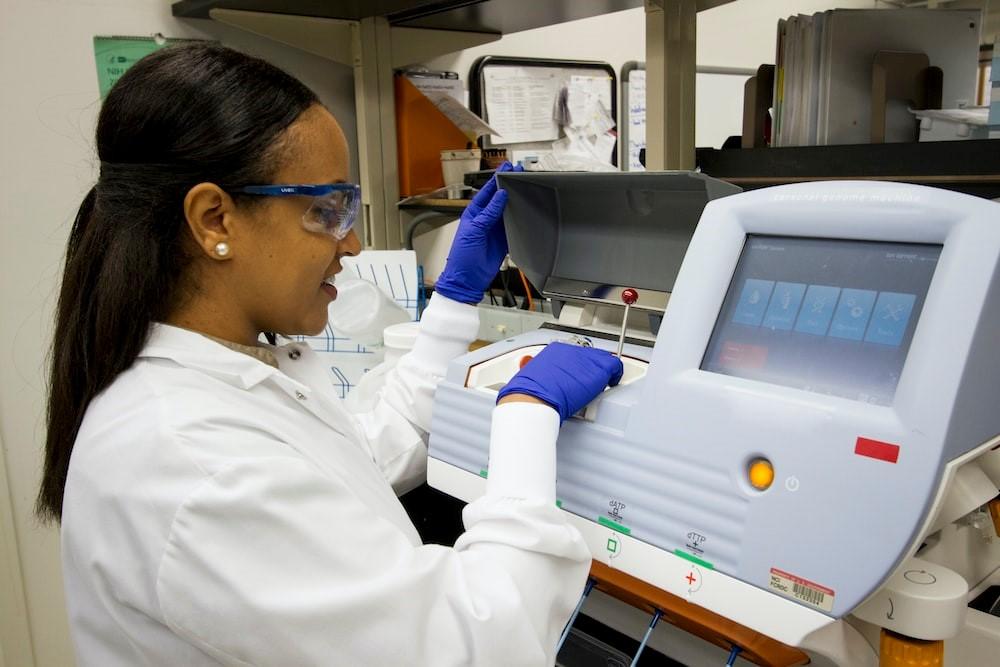Biotechnology is a branch of science that combines biology with technology to create new products and processes that benefit humanity. It involves using living organisms, such as bacteria, yeast, and plants, or their derivatives, to produce valuable products such as medicines, vaccines, food, and chemicals.

The field of biotechnology encompasses a wide range of techniques, including genetic engineering, bioprocessing, cell culture, and bioinformatics.
These techniques manipulate living organisms or their components to develop new products or processes.
The first significant breakthrough in biotechnology came in 1973 when Stanley Cohen and Herbert Boyer developed recombinant DNA technology, allowing scientists to manipulate organisms' genetics. This technology enabled the development of genetically engineered organisms, such as bacteria, that could produce human insulin.
In general, biotechnology is a rapidly growing field that has the potential to revolutionize many aspects of our lives. It is driven by technological advances and the increasing understanding of the biological processes underpinning life.

What Are The Applications Of Biotechnology?
Biotechnology has numerous applications across various fields. However, understanding its fundamental concepts and applications requires professional assistance as it is a complex field of study that requires professional assistance. Superprof is an online educational platform that provides one on one tutoring services to assist students in biotechnology courses at affordable per-hour rates.
Let's discuss some of the prominent applications of biotechnology.
Medicine
Biotechnology has enabled the development of new drugs, vaccines, and therapies that have revolutionized medicine. For instance, biotechnology has led to the development of recombinant DNA technology, which allows scientists to engineer DNA sequences to produce new treatments.
Biotechnology is also being used to develop personalized medicine, where treatments are tailored to an individual's genetic makeup, to improve efficacy and reduce side effects.
Agriculture
Biotechnology has transformed agriculture by enabling the development of genetically modified crops resistant to pests, diseases, and environmental stresses. It has increased crop yields and reduced the need for harmful pesticides, resulting in more sustainable agricultural practices.
Biotechnology is also used to develop crops with improved nutritional content and address malnutrition and food insecurity in developing countries.
Environmental Science
Biotechnology addresses environmental issues such as pollution, climate change, and waste management. For instance, bioremediation is a process that uses microorganisms to break down and remove pollutants from the environment.
Biotechnology also helps develop alternative fuels and energy sources that are more sustainable and environmentally friendly.
Industrial Manufacturing
Biotechnology produces a wide range of industrial products, including enzymes, chemicals, and fuels. These products are developed using bioprocessing techniques, such as fermentation, which uses living organisms to produce the desired products.
Biotechnology is crucial in developing new materials, such as bioplastics, which are more sustainable and environmentally friendly than traditional plastics.
Forensic Science
Biotechnology techniques like DNA fingerprinting, PCR, and sequencing are used to identify and analyze DNA samples collected from crime scenes, which helps in identifying suspects and solving crimes.
Biotechnology techniques are also used to determine paternity and maternity in cases of legal disputes and immigration.
Bioinformatics
Bioinformatics is a field of biotechnology that involves the development of computational tools and techniques for analyzing and interpreting biological data. It is a rapidly growing field with many applications in drug discovery, personalized medicine, and genetic testing.
Bioinformatics tools are used for genome sequencing, gene expression analysis, protein structure prediction, and drug design.
What Degrees Are Available In Biotechnology?
Biotechnology is a multidisciplinary field that uses living organisms, cells, and biological processes to develop products and solutions for various applications.

Here are the several degree programs available in biotechnology at various levels of study!
Bachelor Of Science (B.Sc.) In Biotechnology
This undergraduate program provides a foundation in biotechnology principles, including genetic engineering, molecular biology, and cell culture.
Master Of Science (M.Sc.) In Biotechnology
The program is designed to provide students with advanced knowledge and skills in biotechnology, including bioprocessing, bioinformatics, and biomanufacturing.
Doctor Of Philosophy (Ph.D.) In Biotechnology
This program focuses on research and allows students to specialize in specific areas of biotechnology, such as biopharmaceuticals, agricultural biotechnology, or environmental biotechnology.
Bachelor Of Science (B.Sc.) In Biochemistry
This undergraduate program covers living organisms' chemical and physical processes, including DNA, RNA, and protein synthesis.
Master Of Science (M.Sc.) In Biochemistry
This graduate program provides students with advanced knowledge and skills in biochemistry, including molecular biology, enzymology, and bioenergetics.
Doctor Of Philosophy (Ph.D.) In Biochemistry
This doctoral program is designed for students who want to pursue research in biochemistry, including protein structure and function, metabolic regulation, and signal transduction.
Bachelor Of Science (B.Sc.) In Biomedical Engineering
This undergraduate program combines engineering principles with biological and medical sciences to develop new technologies and devices for healthcare.
Master Of Science (M.Sc.) In Biomedical Engineering
This graduate program provides students with advanced knowledge and skills in biomedical engineering, including medical imaging, biomaterials, and biomechanics.
Doctor Of Philosophy (Ph.D.) In Biomedical Engineering
This doctoral program focuses on research and allows students to specialize in specific areas of biomedical engineering, such as tissue engineering, biomedical instrumentation, or medical robotics.
Some universities also offer specialized programs in various subfields of biotechnology, such as bioprocessing, biomedical engineering, bioinformatics, and biomanufacturing. However, learning and preparing for these courses can be difficult on your own. Hiring a biology teacher from Superprof will help you understand complex concepts in a fun and easy way so that you can contribute to innovations with your exceptional biotech skills and knowledge!
These programs may be offered as stand-alone degrees or concentrations within a more extensive biotechnology program. The specific programs offered by universities may vary depending on their curriculum and focus.
Hence, it is essential to research individual schools to determine what degree programs they offer in biotechnology.

What Are The Jobs Available With A Biotechnology Degree?
The field of biotechnology encompasses a wide range of industries, including pharmaceuticals, agriculture, food and beverage, and environmental science. As a result, many jobs are available in biotechnology, ranging from research and development to production and marketing.

Here are some of the most common jobs with a biotechnology degree!
Research Scientist
A research scientist researches to develop new products or improve existing ones. It may involve working in a lab or the field. They are responsible for designing experiments, collecting and analyzing data, and presenting findings to other scientists or stakeholders. Research scientists work in various areas, including genetics, microbiology, and biochemistry.
Biomanufacturing Specialist
A biomanufacturing specialist designs and oversees the production of biotech products, such as vaccines, drugs, or medical devices. They manage production teams, ensure quality control, and troubleshoot production issues. Biomanufacturing specialists work in various industries, including pharmaceuticals, biotechnology, and medical devices.
Bioprocess Engineer
A bioprocess engineer develops and optimizes processes for the production of biotech products. They are responsible for designing and testing new equipment or processes, troubleshooting production issues, and ensuring quality control. Bioprocess engineers work in a variety of industries, including biotechnology, pharmaceuticals, and environmental science.
Bioinformatics Specialist
A bioinformatics specialist analyzes large amounts of biological data using computer algorithms and other tools. They are responsible for analyzing genetic data, developing algorithms to predict protein structures or interactions, or analyzing data from clinical trials. Bioinformatics specialists work in a variety of industries, including pharmaceuticals, genetics, and environmental science.
Regulatory Affairs Specialist
A regulatory affairs specialist ensures that biotech products meet regulatory requirements set by government agencies. They are responsible for preparing and submitting regulatory filings, coordinating with government agencies, and ensuring compliance with regulations. Regulatory affairs specialists work in a variety of industries, including pharmaceuticals, medical devices, and food and beverage.
Biotech professionals generally work in various industries, including pharmaceuticals, agriculture, food and beverage, and environmental science. However, the specific job opportunities available in biotechnology might vary depending on the industry and location.
Is Biotechnology A Good Career Option?
Biotechnology is a promising and rapidly growing field with many exciting career opportunities. It is a multidisciplinary field that combines biology, chemistry, engineering, and technology to develop innovative solutions for a wide range of industries, including healthcare, agriculture, environmental science, and more.
The demand for biotech professionals is expected to continue growing in the coming years, driven by the increasing need for new and innovative treatments for diseases, the demand for sustainable and environmentally friendly agricultural practices, and the need for new technologies to address global challenges such as climate change and food security.
In addition to being a promising field with many biotechnology jobs available, it offers the opportunity to positively impact society by developing new treatments for diseases, improving food security and sustainability, and addressing environmental challenges.
Hence, biotechnology is a rewarding and exciting career path for those interested in the intersection of science, technology, and innovation.
What Is The Average Salary For Biotech Specialists In The USA?
Here's a table of some standard biotech job designations in the United States of America, along with their average salaries.
| Job Designation | Average Salary (USD) |
|---|---|
| Biomedical Engineer | $91,410 - $150,710 |
| Biostatistician | $80,000 - $130,000 |
| Biochemist | $54,000 - $120,000 |
| Clinical Research Associate | $50,000 - $95,000 |
| Microbiologist | $43,000 - $99,000 |
| Quality Control Analyst | $42,000 - $85,000 |
| Research Scientist | $60,000 - $120,000 |
| Regulatory Affairs Specialist | $65,000 - $125,000 |
| Biotech Research and Development Manager | $90,000 - $140,000 |
Learn Biotechnology With Superprof
Biotechnology classes and online biology teaching can help students pursue careers in various industries, including pharmaceuticals, agriculture, environmental science, and more.
If you are interested in pursuing various biotechnology careers and want to enhance your knowledge and skills in this field, Superprof offers excellent opportunities to learn from experienced biotechnology tutors.
With Superprof, you can access a vast range of biotechnology classes taught by qualified instructors who can provide personalized guidance to help you achieve your goals. The tutors have years of experience working in the biotech industry and can provide real-world insights to help you succeed.
To get started, simply visit the Superprof website, browse the available biotechnology tutors, and select the one that best fits your needs. Sign up for biotechnology classes and take the first step towards a rewarding career in this exciting field!
Summarize with AI:















